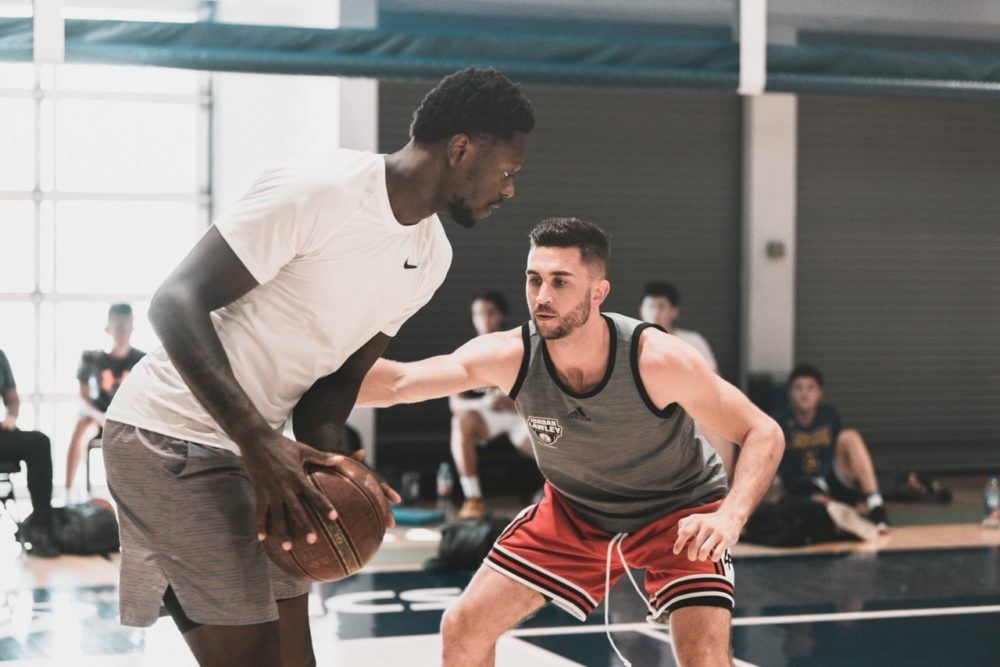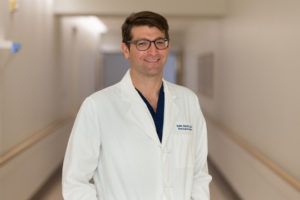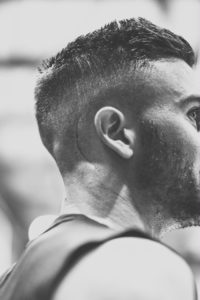
30-Year-Old Has Surgery at Barrow After Brain Tumor Found by Mistake
Jordan Lawley lay motionless in the MRI machine for half an hour while it scanned his head and neck. He wasn’t expecting it to find anything unusual. After all, it should have been scanning his knees.
The 30-year-old professional basketball trainer had been having knee problems for about a month after crashing his car on a California freeway in October 2018. He asked his doctor to order an MRI.
“When I showed up and got in the machine, they said it was only going from mid-chest to the top of my head,” Lawley recalled. “I looked at them and said, ‘That’s a lot of real estate between my neck and my knees.’”
The technicians said the order called for an upper-neck MRI, so he went along with the test and planned to schedule another for his knees.
A Rare Tumor
A couple weeks later, Lawley received a phone call. The MRI showed a mass attached to his cerebellum.
“I had a swollen lymph node on my neck,” he said. “Knowing nothing medically or scientifically, I just thought it showed up on the MRI.”
Lawley underwent a second scan—this time of just his brain. He had the images reviewed by Dr. Kaith Almefty, a neurosurgeon at Barrow Neurological Institute in Phoenix, where his sister-in-law works as a nurse. The mass appeared to be a large acoustic neuroma. It was pressing on Lawley’s brainstem and threatening his ability to walk.
Also known as a vestibular schwannoma, an acoustic neuroma is a rare tumor that develops on the vestibulocochlear nerve—which carries sound and balance information from the inner ear to the brain.
Although acoustic neuromas usually grow slowly and are not cancerous, they can become life-threatening when they compress vital structures in the brain—such as the brainstem and the cerebellum.

“When I hit 30, I would get dizzy laying down on my back, but I chalked that up to being older,” Lawley said. “So if there was a symptom, it was just something like that.”
A 12-Hour Surgery
In April, Lawley traveled to Phoenix from Orange County, California to have surgery with Dr. Almefty, who specializes in acoustic neuromas. His wife, who was eight months pregnant, and their almost 2-year-old son also made the trip.
Lawley said the support of his family, his confidence in his surgical team, and his faith helped him to stay calm as he prepared to undergo a lengthy brain surgery.
“I’ve always been blessed with not worrying much,” he said. “My faith has always been able to get me through a lot. I took this as part of my story and my testimony, and I had the right people in my corner. I knew everything would be OK in the long haul.”
I took this as part of my story and my testimony, and I had the right people in my corner. I knew everything would be OK in the long haul.”
-Jordan Lawley, Barrow Acoustic Neuroma Patient
After the 12-hour surgery, Lawley woke up unable to hear out of his right ear—the side of the tumor. He knew going into surgery that it was a likely outcome. The dizziness and disequilibrium he felt while walking around the hospital didn’t surprise him either.
What he didn’t expect were the pain and swelling he had in his left glute muscle. Lying in the same position for so long had cut off the oxygen supply to his muscle.
But Dr. Almefty had removed all of the tumor—except for a microscopic amount he left on Lawley’s facial nerve to reduce the risk of facial paralysis. Lawley developed weakness on the right side of his face in the days following surgery, but it resolved after a few weeks.
“Dr. Almefty is very meticulous and did a phenomenal job of getting a lot of the tumor off my nerve bundles,” he said. “He got as much as he could without compromising my face, which I’m forever grateful for.”
‘A God Thing’
Lawley left the hospital within 36 hours of the surgery and made his first appearance for his basketball clients about two and a half weeks later.
“I made really good strides early on,” he said. “I still have trouble with balance and spotting, like with targets, and I’m still getting used to the unilateral deafness.”
Despite having to adjust to a “new normal,” Lawley feels blessed. Getting into a car accident, receiving the wrong MRI scan, and having family ties to Barrow wasn’t coincidental, he said. It was “a God thing.”
“It’s been easier for us to sleep at night because we know that everything happens for a reason,” he added.
He said he also feels blessed to have an amazing support system, including his wife, parents, and in-laws.
“My wife is the true trooper because she had to go through this while being pregnant,” he said. “She’s truly my hero.”
Lawley and his wife welcomed their baby girl just a month after his surgery.
“Jordan is a remarkable person,” Dr. Almefty said. “He goes all out in everything he does, and that included growing his tumor. Helping him get back to doing the work he loves and raising his beautiful children is what makes our work satisfying.”
As an otherwise healthy individual, Lawley felt blindsided by his brain tumor diagnosis. That’s why he finds it so important to raise awareness.

“I think I was lucky, for lack of better words, with the MRI and how we found it,” he said. “But for people experiencing symptoms, like dizziness, lack of balance, seizures—you have to make sure this is at the top of your list to look at.”
As for his knees, however, Lawley never did reschedule that MRI.
“I forgot completely about them,” he said.
To request an online second opinion from our acoustic neuroma experts, visit SecondOpinion.BarrowNeuro.org.
